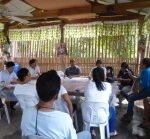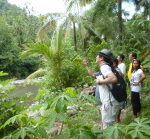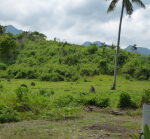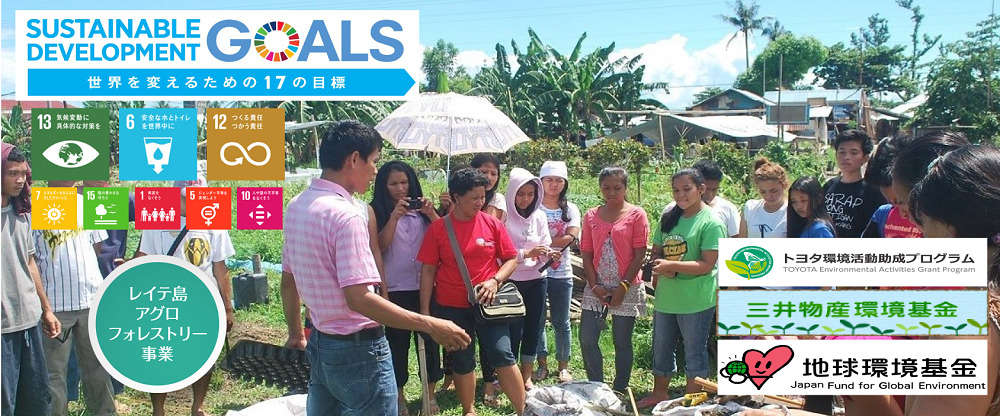
“Agroforestry” It’s a bridge to the next generation
| Project name | Countermeasures for climate change through conversion of coconut farmers to agroforestry |
|---|---|
| Target country | Philippines |
| Region |
Region of Leyte Region Rural area around Albuela, Tanawan, Paro. Leyte Province Rural area around the city of Tanawan in the northeast Leyte Province Rural area around Paro city in the northeast |
| Project period |
2015~2018 Albuela 2019-2020 Tanawan 2020-2022 Northeast Paro City |
| Local implementing organization | WAND Foundation |
| Grants |
Grant Global Environment Fund, Albuela 6,700,000 yen
Toyota Environmental Grant Project, Tanawan 6,900,000 yen The Mitsui & Co. Environment Fund, Paro 7,000,000 yen |
| Overview | For the coconut farmers and local environment around Tanawan City in northeastern Leyte, which had been severely damaged by the Haiyan typhoon in November 2013, through conversion to Agroforestry (AF) and biodiversity improvement through afforestation Enhance capacity to adapt to climate change.The AF system uses demo farm farmers who are eager to spread the farming sector, and disseminate organic cultivation of a wide variety of fruits, trees, vegetables and moss through training of coconut farmers affected by typhoons. In addition, the local organization that will take over the project will be used as the primary agricultural cooperative to increase farmers' income through the sale of agricultural products. |
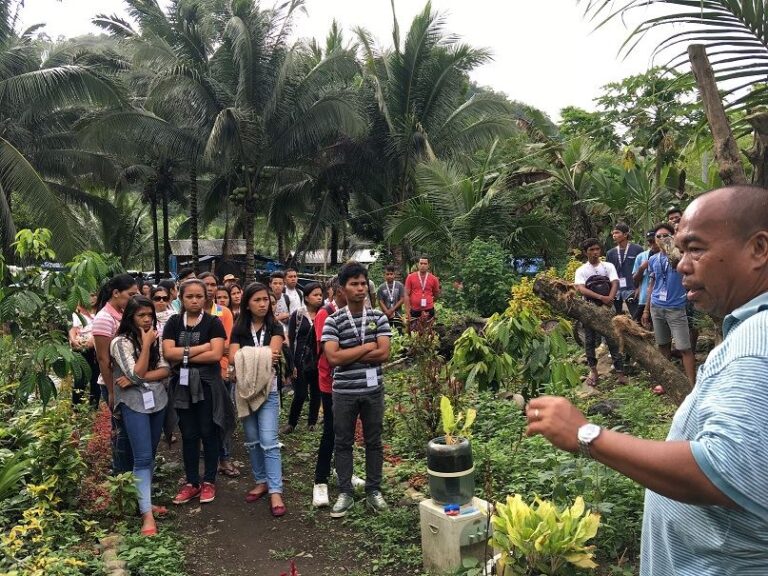
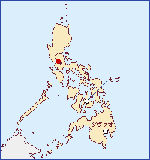

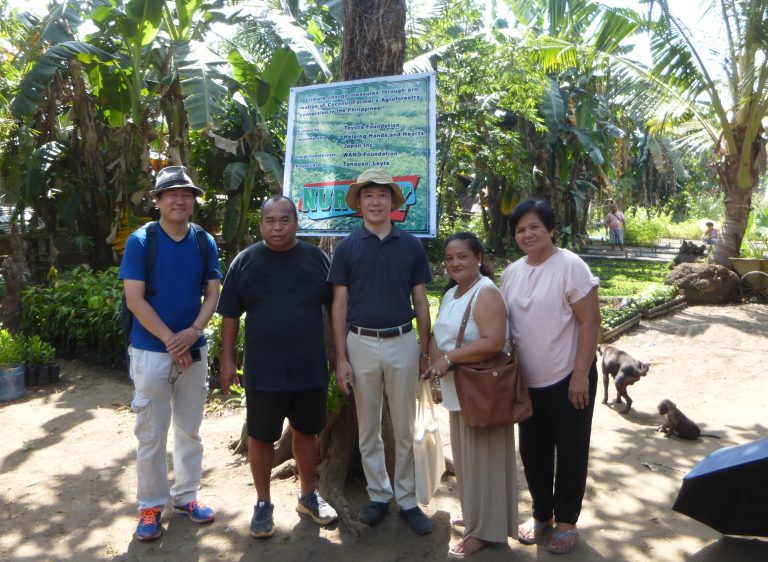
Activity reports
Project Project site: Paro
| 2021 | First year interm reprot |
|---|---|
| 2020 | SDGs Global Change Countermeasure Youth Workshop |
| 2019 | Northeast rural survey |
Project site: Tanawan Project report Comprehensive website
| 2021 | Second year first half interim report |
|---|---|
| 2020 | Interm report Visit to Tanawan |
| 2019 | Project start in Tanawan Interim report |
| 2019 | Project start |
Albuela
| 2018 | Transferred to local organization (WACCA) |
|---|---|
| 2017 | Second year |
| 2016 | First year in Albuera |
| 2015 | WAND Foundation Western Leyte Rural Area Survey Ormoc Albuera |
Activity scenery
Project background
In November 2013, a typhoon Haiyan called Yolanda attacked in the country in November 2013, causing serious damage to the economy, society and environment of Leyte Island, the most severely damaged country. The number of domestic victims of the typhoon is said to be about 10,000. The main impact on the environment and economy of local farms in Typhoon Haiyang is a serious blow to the lives of coconut farmers and surrounding forests. The typhoon Haiyan’s invasion resulted in massive destruction and disappearance of tropical and coconut trees. This resulted in more severe soil erosion, landslides (which caused more than one household victim in Tanauan, northeastern Leyte), and reduced freshwater supply. For this reason, recovery of tropical forests is an urgent task. However, many farmers in the affected areas are still unaware of farming methods other than coconut cultivation due to long-standing dependence on coconut agriculture. In addition, many coconut farmers are embedded in coconut local trading systems mediated by middlemen and do not know how to sell other crops. They lost their way of life due to the loss of coconut trees and relied solely on aid and non-farm work. Even if you want to resume coconut farming, it will take at least 8 years for newly planted trees to grow and produce fruit. So they need to get an alternative means of living by then. Furthermore, if disaster-stricken farmers continue to rely solely on coconuts as a source of income in the future, similar disasters may occur if similar disasters triggered by climate change occur. Therefore, there is an urgent need not only for the recovery of coconut cultivation but also for the recovery of local forests and the recovery of the farm economy of coconut farmers.
Activity strategy and countermeasures
The proposed agroforestry system is a mixed agriculture that incorporates various vegetables, root vegetables and fruits. These crops are used not only for farm household consumption but also for their market sales. Coconut trees are also grown as a future source of income. Planted bamboo (bamboo), high value-added fruit trees and wood trees are used for self-consumption and sales, but these are not limited to economic purposes. They are the improvement of soil erosion, where precious soil is lost because the wind speed of the surface increases due to the destruction of the forest covering the surface due to the influence of the typhoon, and the exposed soil is washed away into the sea and rivers by rain. Connected. In addition, such afforestation activities can restore the function of the “natural dam”, in which the forest soil retains moisture during rainfall for a long period of time and supplies a certain amount of available fresh water on a regular basis. . In addition, crops and trees are cultivated based on organic farming and low-input technology, which reduces the use of pesticides and chemical fertilizers, helps protect people’s health and the environment, and enables connection to a premium market. In addition, manure is used as an organic fertilizer through goat and pig breeding, and the root vegetables grown are also used as livestock feed (material circulation in the system). Thus, this agroforestry project does not simply address either “reconstruction of affected farmers” or “preservation of the natural environment in the affected areas”. It emphasizes the “coexistence of the environment and development” in which affected farmers strengthen their economic bases through the protection of the local natural environment, and achieve recovery from disasters in both nature and humans. In December 2016, the first year of the project, Visaya State University will conduct an initial survey on the current state of coconut farmers in the target area and identify farmers who want to convert to agroforestry. The Wand Foundation will then provide the necessary resources and training for farmers who want to convert. Farmers who have succeeded in conversion will promote agricultural dissemination among farmers by becoming a demonstration farm where other farmers learn their experiences and methods and also serve as a source of timber for other farmers. The anticipated risk is that it is difficult for individual farmers to sell food in the local market, mainly mediated by middlemen. This difficulty will be dealt with by establishing a primary cooperative that will be marketed and sold by representatives selected from the Demo Farm.
活動風景
Why don’t you give it a try with us?
Please feel free to contact us.

